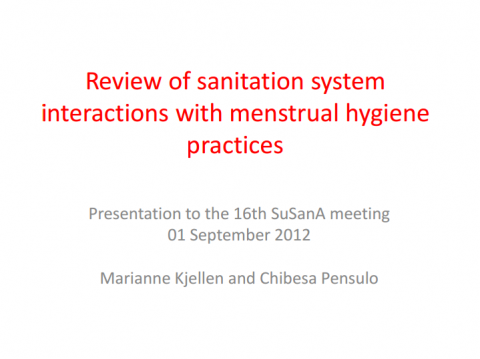This library entry contains background documents for a grant that Vivian Hoffmann is leading and which is funded by the Bill and Melinda Gates Foundation.
Further information and a discussion is available on the SuSanA discussion Forum, see link below.
Short description of the project:
The project will address the interactions between menstrual management and sanitation, using a systems approach that integrates an understanding of the sanitation hardware with women’s practices, needs and willingness to pay for menstrual management products. The scope of work includes: 1) a comprehensive literature review to synthesize current knowledge about the interaction between women's menstrual management practices and sanitation systems, 2) detailed case studies in two urban locations, and 3) a randomized product dissemination and demand trial where women will be offered to opportunity to test and then choose among alternative menstrual management products.
Goal(s):
This study aims to understand:
-The experiences of women in managing their menstrual periods, including the products that they use, their perceptions of the sanitation facilities they use, and how their periods may impact their daily routines.
-Women’s preferences for alternative menstrual management products that may have less impact on sanitation systems.
-The influence of women’s social networks on product adoption and other behaviours.
Objectives:
-Synthesize the state of current knowledge through a review of the literature on women’s perceptions and cultural beliefs around menstruation, and menstrual practices.
-Understand the impact of menstrual practices on sanitation systems through a global survey of sanitation managers.
-Document how menstrual products are disposed of in two contexts: Durban, South Africa and Bihar, India.
Investigate the acceptability of a reusable silicon menstrual cup among adult women in two contexts: Durban, South Africa and Bihar, India. Understand determinants of, and barriers to, product experimentation and continued use, including experience of peers.
-Test how prior use of a disposable menstrual product (sanitary pads) affects demand for a reusable product (the menstrual cup) through a randomized controlled trial in Bihar, India.
Research or implementation partners:
PATH, Stockholm Environment Institute, Columbia University, Wits Health Consortium, Mount Holyoke College, and the University of KwaZulu-Natal
Further Reading (Journal articles):
- Sommer, Marni, Marianne Kjellen, and Chibesa Pensulo. “Girls’ and Women’s Unmet Needs for Menstrual Hygiene Management (MHM): The Interactions between MHM and Sanitation Systems in Low-Income Countries”, accepted for publication by Journal of Water, Sanitation and Hygiene for Development
- Sebastian, Ashwini, Vivian Hoffmann, and Sarah Adelman, “Menstrual Management in Low Income Countries: Needs and Trends”, forthcoming in April 2013 issue of Waterlines
A report by partners on this project from the Stockholm Environmental Institute, Marianne Kjellén, Chibesa Pensulo, Petter Nordqvist and Madeleine Fogde, is available online:
Global review of sanitation systems trends and interactions with menstrual management practices
http://www.susana.org/lang-en/library/library?view=ccbktypeitem&type=2&id=1556
+++++++++++
Documents available for download below:
1 - Menstrual management and sanitation systems - policy brief (India)
2 - Preliminary baseline survey findings (Durban South Africa, 2012)
3 - Review of sanitation system interactions with menstrual hygiene practices (presentation at FSM2 Conference in Durban, South Africa, Oct. 2012)
Bibliographic information
Hoffmann, V. (2013).
Menstrual management & sanitation systems Various documents on results from research grant University of Maryland, USA
Filter / Tags
Fundamental research and engineeringEnglishMenstrual Health and Hygiene (MHH)
External links
Further information on discussion forum
Downloads
1- Menstrual management and sanitation systems study overview
Download
Type: application/pdf
Size: 0.36 MB
2 - Preliminary baseline survey findings (Durban, South Africa, 2012)
Download
Type: application/pdf
Size: 0.02 MB
3 - Review of sanitation system interactions with menstrual hygiene practices (presentation at FSM2 Conference in Durban, South Africa, Oct. 2012)
Download
Type: application/pdf
Size: 0.34 MB

Published in: 2013
Pages: 0
Publisher:
University of Maryland, USA
Author(s):
Hoffmann, V.
Uploaded by:
Location of library entry:

